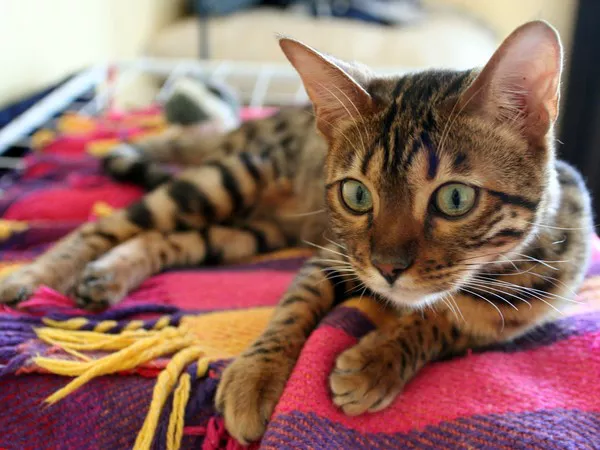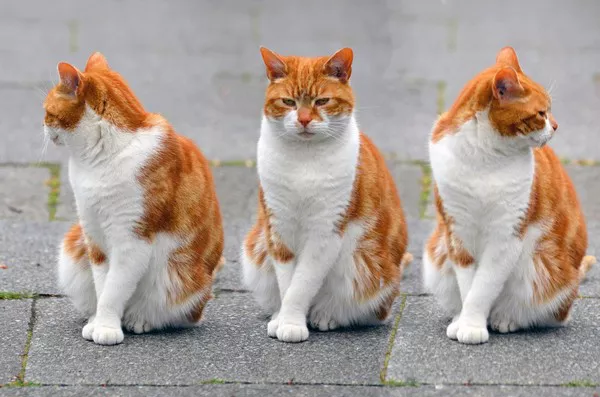Owning a pet brings immense joy, but it also comes with a fair share of concerns and questions. One common worry among cat owners is noticing their cat is skinny but otherwise seems healthy. This situation can be puzzling and even alarming. However, it is essential to understand that a cat’s weight is not the sole indicator of its overall health. This article will explore the various reasons why your cat might be skinny yet healthy, the signs of good health in cats, and when you should be concerned.
Normal Variation in Cat Body Types
Cats, much like humans, come in different shapes and sizes. Some breeds are naturally lean and slender, while others are more robust and muscular. Understanding your cat’s breed and natural body type is the first step in determining whether its skinniness is a cause for concern.
Breed-Specific Traits
Certain cat breeds, such as the Siamese, Oriental Shorthair, and Abyssinian, are naturally slender. These breeds have a genetic predisposition for a lean body type, which is entirely normal and healthy. They often have a high metabolism and a more active lifestyle, contributing to their slender appearance. If your cat belongs to one of these breeds, being skinny might be perfectly normal.
High Metabolism and Activity Level
Cats with a high metabolism or those that are particularly active tend to be skinnier. Just like in humans, metabolism plays a significant role in determining a cat’s weight.
Understanding Metabolism
Metabolism refers to the biochemical processes that occur within a living organism to maintain life. Cats with high metabolic rates burn calories more quickly, which can lead to a leaner body. This is often seen in younger cats and those that are highly active, such as those who spend a lot of time playing or exploring outdoors.
Active Lifestyles
An active cat will naturally burn more calories than a sedentary one. If your cat is constantly on the move, climbing, jumping, and playing, it will have higher energy expenditure, contributing to a leaner physique. Regular exercise is beneficial for your cat’s overall health, promoting good cardiovascular health, mental stimulation, and muscle tone.
Diet and Nutritional Needs
Diet plays a crucial role in your cat’s overall health and body condition. Ensuring that your cat receives adequate nutrition can help maintain a healthy weight.
Quality of Food
The quality of food you provide your cat can significantly impact its health and weight. High-quality cat foods formulated with balanced nutrients, including proteins, fats, vitamins, and minerals, will support a healthy body. Ensure that the food meets the nutritional requirements specified by organizations such as the Association of American Feed Control Officials (AAFCO).
Feeding Frequency and Portion Control
The way you feed your cat can also influence its weight. Some cats may benefit from multiple small meals throughout the day rather than one or two large meals. This feeding strategy can help maintain steady energy levels and prevent overeating or undereating.
Special Dietary Needs
Some cats have special dietary needs based on their age, health status, or activity level. Consult with your veterinarian to ensure that your cat’s diet meets its specific needs. For example, kittens and active adult cats may require more protein and calories compared to older, less active cats.
Health Indicators in Skinny Cats
While a skinny cat can be healthy, it is crucial to look for signs that confirm your cat’s overall well-being.
Bright Eyes and Clean Ears
A healthy cat typically has bright, clear eyes and clean ears. Discharge, redness, or excessive scratching can indicate health issues that may require veterinary attention.
Shiny Coat and Healthy Skin
The condition of your cat’s coat and skin can tell you a lot about its health. A healthy cat will have a shiny, smooth coat and clear, elastic skin. Hair loss, dandruff, or dry, flaky skin may be signs of underlying health problems.
See Also: Are Japanese Bobtails Talkative?
Normal Appetite and Thirst
A cat that eats and drinks regularly is usually a sign of good health. Sudden changes in appetite or drinking habits can be indicators of health issues.
Good Dental Health
Healthy teeth and gums are vital for your cat’s overall health. Regular dental check-ups and cleanings are essential to prevent dental diseases that can affect your cat’s ability to eat and maintain a healthy weight.
Regular Bowel Movements
Regular and normal bowel movements are another indicator of good health. Changes in stool consistency, color, or frequency can indicate digestive issues or other health problems.
Medical Conditions That Can Affect Weight
While some skinny cats are perfectly healthy, certain medical conditions can cause weight loss. It is essential to be aware of these conditions and seek veterinary advice if you suspect your cat may be affected.
Hyperthyroidism
Hyperthyroidism is a common condition in older cats where the thyroid gland produces excess thyroid hormone. This hormone increases the cat’s metabolism, leading to weight loss despite a normal or increased appetite. Other symptoms include increased thirst, hyperactivity, and changes in coat condition.
Diabetes Mellitus
Diabetes is another condition that can cause weight loss in cats. Symptoms include increased thirst, frequent urination, and a ravenous appetite. Untreated diabetes can lead to severe complications, so it is essential to seek veterinary care if you notice these signs.
Intestinal Parasites
Intestinal parasites, such as worms, can cause weight loss and poor body condition in cats. Symptoms include diarrhea, vomiting, and a distended abdomen. Regular deworming and veterinary check-ups can help prevent and treat parasite infections.
Gastrointestinal Disorders
Gastrointestinal disorders, such as inflammatory bowel disease (IBD), can cause weight loss and poor nutrient absorption in cats. Symptoms include chronic diarrhea, vomiting, and changes in appetite. These conditions often require long-term management and dietary adjustments.
Chronic Kidney Disease
Chronic kidney disease (CKD) is a common condition in older cats that can cause weight loss, increased thirst, and changes in urination. Regular veterinary check-ups and appropriate dietary management are essential for cats with CKD.
When to Be Concerned
While a skinny cat can be healthy, it is crucial to know when to be concerned and seek veterinary advice.
Sudden Weight Loss
Sudden or unexplained weight loss can be a sign of an underlying health issue. If your cat loses weight rapidly without any changes in diet or activity level, consult your veterinarian.
Changes in Behavior or Appetite
Any sudden changes in your cat’s behavior or appetite can indicate health problems. If your cat becomes lethargic, stops eating, or shows signs of pain or discomfort, seek veterinary attention.
Visible Health Issues
Visible health issues, such as skin problems, dental issues, or gastrointestinal symptoms, should be addressed promptly. Regular veterinary check-ups can help detect and treat these issues early.
Maintaining a Healthy Weight for Your Cat
Maintaining a healthy weight for your cat involves a combination of proper nutrition, regular exercise, and routine veterinary care.
Balanced Diet
Provide a balanced diet that meets your cat’s specific nutritional needs. Consult with your veterinarian to choose the right food and feeding plan for your cat.
Regular Exercise
Encourage regular exercise through play and interactive toys. Cats enjoy activities such as chasing laser pointers, playing with feather wands, and climbing on cat trees.
Routine Veterinary Care
Regular veterinary check-ups are essential to monitor your cat’s health and detect any potential issues early. Vaccinations, dental care, and parasite prevention are crucial components of routine care.
Conclusion
A skinny cat can indeed be healthy, provided it shows other signs of good health such as a shiny coat, bright eyes, normal appetite, and regular bowel movements. Understanding your cat’s breed, activity level, and nutritional needs can help you determine whether its weight is normal. However, it is essential to remain vigilant and consult with your veterinarian if you notice any sudden changes or signs of illness. By providing a balanced diet, regular exercise, and routine veterinary care, you can help ensure your cat maintains a healthy weight and enjoys a long, happy life.



























